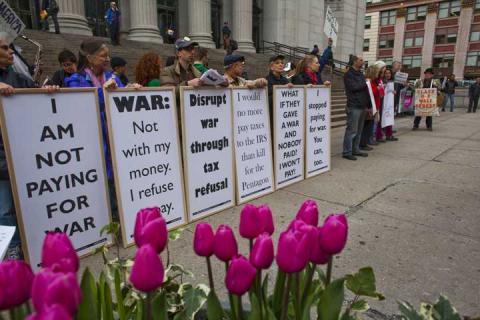On April 15 people in communities across the United States will be leafleting, marching, doing street theatre, committing civil disobedience, and picketing at post offices, IRS offices, federal buildings, among other public spaces, using materials calling attention to the harmful effects of military spending. A list of U.S. Tax Day events with links to international actions can be found at www.nwtrcc.org/taxday2013.php. April 15 is also the third annual Global Day of Action on Military Spending.
Thirty years ago, during his first term, President Ronald Reagan set off a massive buildup in the U.S. armed forces that stands out on historical graphs of U.S. military budgets since World War II. This motivated thousands of taxpayers to resume the civil disobedience (begun during the Vietnam War) by refusing to pay taxes to buy those weapons, and led to the 1982 formation of the National War Tax Resistance Coordinating Committee (NWTRCC). In that same year Archbishop Raymond Hunthausen of Seattle, risking official censure, withheld half his income tax to protest nuclear weapons, calling on others to do the same.
The spike in military spending since 2001 surpasses that of the Reagan years. Today U.S. taxpayers are buying even more expensive weapons systems, new nuclear weapons plants, assassinations by unmanned drones, and soaring interest payments on the national debt along with burgeoning health care costs for thousands of wounded veterans.
On March 30, 1983, an ad placed in a Massachusetts weekly began, ?We refuse to pay taxes for the violence of war preparations and other military expenditures including present military involvement in other countries. Over half of the federal income taxes are used for military expenses.? Many of the 120 signers still refuse today and still protest on tax day, joined by newer activists who have been provoked into protesting taxes for the wars in Afghanistan and Iraq as well as the endless war on terror.
Massachusetts residents Randy Kehler and Betsy Corner were signers of that 1983 ad. Despite a house seizure and other collection efforts by the IRS, Kehler and Corner say, ?With the federal government running up huge deficits by spending trillions of taxpayer dollars on weapons and war, at the expense of its own people (especially its soldiers) and the people of other countries, we invite our fellow citizens to join us in saying 'No!' and to begin re-directing their federal tax money to local projects that meet genuine human needs.?
On the evening of April 15 in Berkeley, California, members of Northern California War Tax Resistance and the People's Life Fund will be taking this advice and presenting grants of resisted war taxes totaling over $20,000 to local social service, peace, and justice organizations. That event and others from Maine to Kentucky to Washington are posted online with contacts at http://www.nwtrcc.org/taxday2013.php.
Contact NWTRCC to talk with individual war tax resisters and refusers.
Ruth Benn, Coordinator
National War Tax Resistance Coordinating Committee
PO Box 150553
Brooklyn, NY 11215
800-269-7464
http://www.nwtrcc.org/
http://www.wartaxboycott.org/


Spread the word